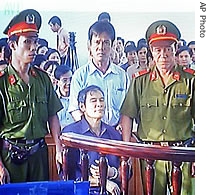2007年VOA标准英语-Sentence for Vietnamese Priest Highlights Gulf(在线收听)
Hue, Vietnam
03 April 2007
Over the past several years, Vietnam's communist government has relaxed restrictions on private business, religious activities and the media. But as the recent conviction of Catholic priest Nguyen Van Ly shows, Hanoi draws the line at political dissent. As Matt Steinglass reports from the city of Hue, it is a trade-off that many Vietnamese appear ready to accept.
Hundreds of Catholics attend afternoon mass at the Church of the Redemptorist Fathers in Hue.
Only a decade ago, many Vietnamese Catholics were careful about displaying their faith, concerned about running afoul of the ruling Communist Party.
That has changed, however, as the government has become increasingly tolerant of religious activity. It also has loosened restrictions on the media and private enterprise.
 |
| Catholic priest Nguyen Van Ly, center, is seen in court room in Vietnam's central province of Thua Thien Hue, 30 Mar 2007 |
At the end of the trial, Ly was sentenced to eight years in prison, and four associates received lighter sentences.
They had published an independent newsletter and founded an alternative political party, the Progression Party. The government said they had violated laws against disseminating political propaganda against the Vietnamese state.
The Catholic Church has been quiet about Ly's imprisonment - because it does not appear he was singled out for his religion.
Father Joseph Le Viet Phuc explains that in principle, a priest should not engage in politics. He says he continues to visit Ly, but only out of charity, to show him that he is not abandoned.
Phuc also says Ly's political activism had damaged his ability to serve his parish.
Phuc says he had been sent to minister to Father Ly's congregation, because Father Ly no longer could. He says people no longer dared come to Ly's services, for fear of police surveillance.
Ly first gained international attention in 2001, when he sent written testimony on religious repression in Vietnam to the U.S. Commission on International Religious Freedom.
But the manifesto of his Progression Party does not mention religion. It says its goal is to non-violently oppose the Communist Party and establish free democratic elections.
During the trial, when the accused tried to explain their goals, they spoke of international law and patriotism, not religion. Nguyen Phong, sentenced to six years in prison Friday, was the Progression Party's founding chairman.
Phong declared in the court, "For the Vietnamese nation, I will continue to fight for democracy," before police cut his microphone.
A number of other priests have been involved in Ly's activist efforts. Father Phan Van Loi edits the independent newsletter, Freedom of Speech.
Loi says Freedom of Speech has been published since April 2006, and small quantities have been distributed privately around the country. He says they published the 24th edition several days ago, and are working on the next one.
But Loi says the police make his life difficult.
Loi says the authorities have confined him to his house since February 18. He says that starting on March 30, police surrounded his house to prevent him from leaving.
The government's restrictions on dissent seem to contrast with its other recent liberalizations. The government press ran stories about Ly's trial. Foreign news reports on the trial, on the Internet and cable television, ran uncensored in Vietnam.
Tourist Gerard Bobie, from Luxembourg, saw reports of the trial on an international television broadcast in Vietnam. He says he had the impression that Vietnamese are free in every sense but one.
"The impression is always the same, that people speak about everything, but just not about politics," he said.
Hotel and restaurant owner Nguyen Thi Kim Phuong said few Vietnamese are interested in taking the risk of criticizing the government.
Phuong says Vietnamese these days prefer to talk about business and everyday life, which are improving. They never talk about politics.
The ruling Communist Party is increasingly willing to let its citizens do business, read foreign media and worship as they want, as long as they do not challenge the rule of the Communist Party. Most Vietnamese seem ready to accept that deal.